How to determine the type of temperament?

All people can be conditionally divided into four main psychotypes. Knowing the main features of each of them, you can easily determine which person is in front of you now, how to talk to him and what kind of response to expect. Such skills will be useful regardless of your field of activity, because we all live in society. Let's try to clearly and easily explain what the key differences between them are and how to quickly determine the type of temperament.
Types
The type of temperament is largely determined by heredity. But this does not mean that it cannot change during life. Under the influence of external factors and personal beliefs, it is possible to largely correct those behavioral models that are inherent in a person by psychotype.




Choleric
The "yellow bile" prevailing in these people endows them with a hot-tempered character. Such personalities physiologically cannot restrain emotions, both positive and negative. Everyone has heard the expression "lights up like a match." One awkward word is enough to unbalance the choleric person. But their main advantage is the ability to cool down quickly. Choleric people will not hold grudges and build a multi-step plan of revenge. After a while, these people will forget both the offender himself and the reason that was the reason for the violent reaction.
They are naturally strong people. They are able to solve even complex problems. But the problem is that their volatility often hurts the case. People of this type can flare up and quit what they started or even get carried away with another project.Leadership skills often prevail, and yet they get their way. But these same qualities lead to the fact that choleric people strive to be the first not only in any business, but also in any dispute. They are often instigators in various high-profile disputes and showdowns.



You can also define a choleric person by verbal signs: his movements are abrupt, and his gait is impetuous.
Slowness is not at all characteristic of this type, they speak quickly and a lot. At the same time, speech is colored emotionally, vivid comparisons and exaggerations are used. Facial expressions are also very mobile and expressive. Such a person literally has everything "written on his face." He does not know how and does not want to hide his emotions.
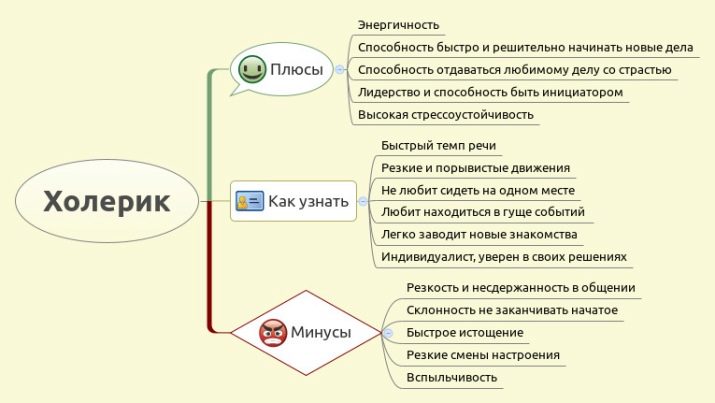
Phlegmatic person
Phlegmatic people are calm and balanced people, they are not subject to sudden outbursts of anger and are used to thinking and weighing everything well. Phlegmatic people will never make any important decision under the rule of feelings or in the heat of the moment. Logic and a judicious approach are their strong points.
Because of this, many consider them rather slow. But it is thanks to these qualities that phlegmatic people become good leaders. A phlegmatic person will not unreasonably find fault with subordinates, his decisions are weighed, he gets along well with others and is able to maintain a sober view of the situation even under the most difficult circumstances. At the same time, they are not subject to ambition. Phlegmatic people adequately assess themselves and those around them, based on facts.
Of the shortcomings of the psychotype, one can single out the inability to quickly adapt to new conditions.
If something does not go according to plan, then they will need time to think carefully about everything. It is very difficult for them to make a decision here and now. But on the other hand, they look closely at people for a very long time before starting to trust them. This is the key to a strong relationship in the future. Such individuals are loyal and value friendship.



Sometimes it is very difficult to communicate with phlegmatic people, since they do not show even a bit of emotion. It is impossible to understand whether you are interesting to him as an interlocutor. Such passivity and even indifference is only to their detriment. But it is quite possible to come to a compromise with them if you provide enough facts in favor of your decision.
It is very easy for parents with a phlegmatic child. Kids listen attentively to requests, they are distinguished by a calm disposition. By their appearance, you can recognize them by the slow pace of speech (with pauses) and the slowness of movements. They often take a break before answering the question posed.
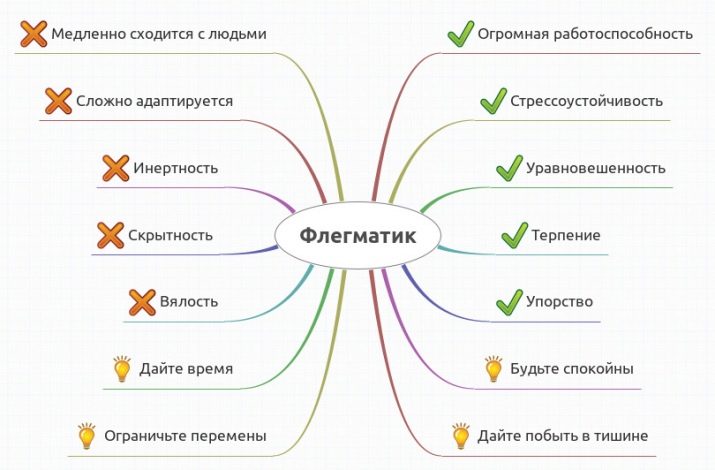
Melancholic
At first glance, it seems that this type of temperament did not get the best qualities. They are very vulnerable, sensitive to any criticism. Any non-standard situation can unsettle them. But thanks to the high sensitivity, they see the world in all colors. The smallest manifestation of the beautiful (or impartial) will not escape them. This main quality allows them to achieve high results in the creative field. They make excellent artists, musicians, sculptors.



A rich imagination sometimes does not play into their hands. After all, even if nothing bad has happened yet, they have already “played” the entire scenario of possible consequences. And if he is sad, then the melancholic will begin to worry about it now. Often they are right in their predictions, since they are able to see the problem long before it appears.
Recognizing a melancholic by description is quite simple. They have a quiet voice, their speech is reasonable and devoid of emotional coloring. At the same time, melancholic people will argue, although not as brightly and aggressively as choleric people. They are used to defending their point of view, albeit in a very calm form.
Melancholic people are very loyal. A person with a fine mental organization painfully experiences not only his own problems, but also the troubles of a loved one.
For the most part, melancholic monogamous. The melancholic's partner will not have to doubt his sincere intentions and look for pitfalls.
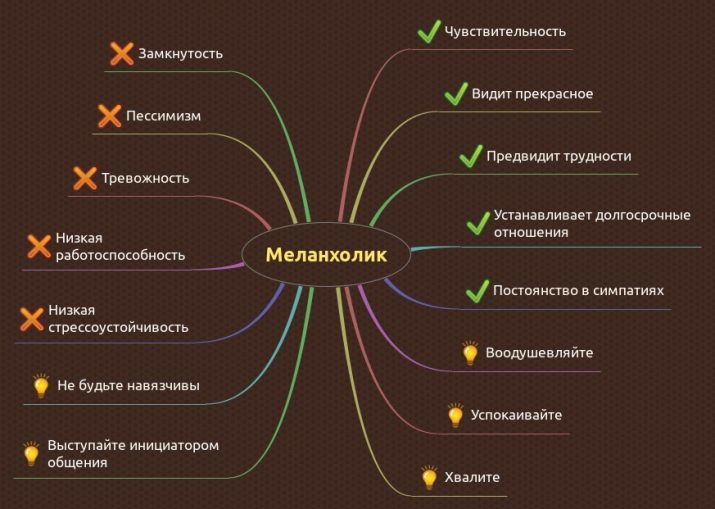
Sanguine
They are very bright and memorable personalities. But they are very fickle. Now a sanguine person can be sad and depressed, and after a minute he can get carried away and laugh loudly at the interlocutor's joke. If something did not go according to their original plan or they were defeated in something, then they will not worry for a long time. They also easily experience criticism. Of the non-verbal manifestations, an involuntary smile on his face can be distinguished.
Sanguine people try to achieve their goal in the simplest and most effortless way. Although these personalities are good initiative workers, they often do everything superficially. Such employees will not delve into causal relationships, but will simply do their job.
Do not count on the fact that these individuals will show increased zeal and take on additional concerns. But the immediate job responsibilities will be fulfilled. Easy adaptation to rapidly changing conditions is a positive quality. This gives them a competitive edge in many situations.
While the rest will reflect on the reasons for what happened, the sanguine person will already build a new strategy of behavior.



Features of behavior
In addition to the main features of each type of temperament, they are characterized by certain patterns of behavior. Of course, one should not ignore the fact that mixed types are often found, and then it becomes much more difficult to give an accurate characterization. We will consider the main features of the behavior of psychotypes. Based on them, you yourself can draw conclusions about what type this or that person or yourself belongs to.
Choleric people are not distinguished by a restrained character. You should not enter into heated discussions with them, especially if you want to come to a compromise. Give in to him, and the choleric person will quickly cool down and be able to perceive the situation more adequately. Choleric people are not vindictive. As soon as the annoying factor disappears "from the field of view", the choleric person will quickly forget about his resentment or irritation.
They are strong personalities who often have a bright appearance. They achieve their goal by any means. These individuals are able to overcome difficult obstacles and difficulties. For them, being in a leading position is more important than temporary difficulties and hardships.


It is very difficult for a choleric to pull himself together and restrain himself. Knowing this feature, you will adequately perceive his sudden outbursts of anger.
The psychological characteristics of the phlegmatic speaks of his slowness and prudence. The same is reflected in his behavior. Such personalities are conservative and hardly accept new trends. For them, it is more comfortable to act according to an already familiar plan than to reinvent the wheel every time.
They do not like it when their point of view is imposed on them. They have their own clear plan, from which phlegmatic people will not give up even under the influence of external factors. At the same time, these personalities are logical and consistent, they always bring what they started to the end. One of the main features of phlegmatic behavior is patience. Where choleric people lose their temper, and melancholic people succumb to apathy, the phlegmatic person will wait in the wings and remain indifferent to the difficulties that have arisen.
As for the characteristic behavior of melancholic people, one can single out their perseverance and hard work. They deeply delve into the details of the work and try to perform it at the highest level. Most perfectionists belong to this type of temperament.



Phlegmatic and sanguine people find it difficult to understand such slowness and sluggishness in actions. They will feel that this is a passive worker, not showing enthusiasm. But this is not the case. It's just that melancholic people are used to keeping all their emotions to themselves. Phlegmatic people deeply experience any criticism, even if it is rational.
A melancholic child can be recognized by his interest in various areas of life. They carefully study everything that surrounds them, trying to understand the essence of everything that is happening.But melancholic people get along with their peers very hard until they find a kindred spirit that they can trust completely.


Sanguine people are pleasant companions in all respects. Firstly, these individuals will not lie, and secondly, their stories are very interesting to listen to. They like to joke, but for the most part these are harmless and even cute jokes. Sanguine people often make friends not for deep relationships, but for quantity. There are always many friends, acquaintances and other "retinue" around them.
A sanguine person perfectly manifests himself both as a leader and as a subordinate. Such an employee quickly gets involved in work and grasps everything new on the fly. Able to work in multitasking mode. He is interested in solving complex problems. But what this personality type will not tolerate is routine. Boring work will quickly bother him and he will do the work already "slipshod".
Men of this type easily win the attention of women. It is pleasant to communicate with them, they are quite courteous and resourceful.



Methods for determining temperament
There are several proven diagnostic techniques for determining the type of temperament. They differ both in the number of questions asked and in their focus. When choosing one of them, it is necessary to consider who will pass it. Some are suitable for preschoolers and younger students, while others are for teens and adults. Studying the child's temperament will allow you to build the most fruitful and correct relationship with him.
Eysenck questionnaire
This test contains 100 questions. You won't have to think long about each of them. It is enough to read the statement and agree with it or not. This will help determine the predominant type inherent in you. It is interesting that with its help it is possible to identify the mixed type. This will be indicated by the percentage. The test should be conducted in a calm environment. You shouldn't set a time frame, but you don't need to dwell on any point either.

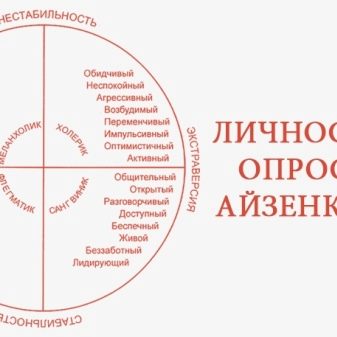
Obozov's methods
Quite a simple and interesting way to define temperament. There are no only categorical answers "yes" and "no". For each trait, there is a scale on which you choose the degree of manifestation of a particular trait. And if for other tests the presence of the subject himself is necessary, this test can be carried out in his absence. Just imagine the person and answer for him. After all, you can objectively evaluate parameters such as speech, patience, poise, etc.

V. Rusalov's diagnostics
Diagnostics using the Rusalov method is in many ways similar to Eysenck's questionnaire. There are also 105 statements that you agree with or not. All statements naturally characterize your daily behavior in ordinary situations. Therefore, when answering, you do not need to imagine any extreme or unusual situation. Answer quickly and better without hesitation. It is this approach that will give the most accurate result. This will prevent your logic from making excuses or finding a more “profitable” but untrue solution.

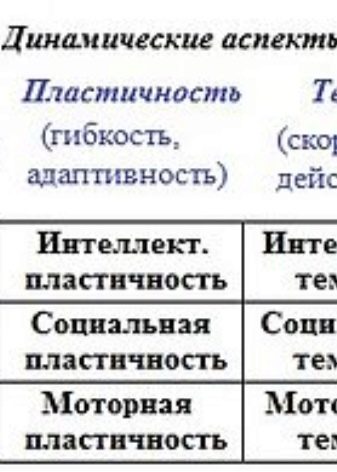
Shooting Questionnaire
It is recommended to perform these exercises (test) at a more mature age, as some questions can confuse preschoolers. Children simply did not face or did not realize what “quick reaction”, “responsible work”, “change of the decision made” are. Parents should take this factor into account when choosing a test to determine a child's temperament. As for the test itself, it evaluates 3 main parameters: the level of arousal, the level of inhibition, the dynamism of nervous processes.
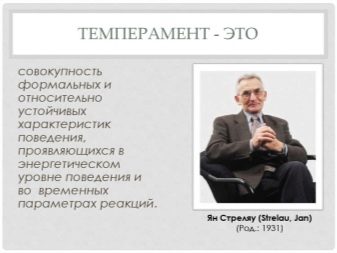
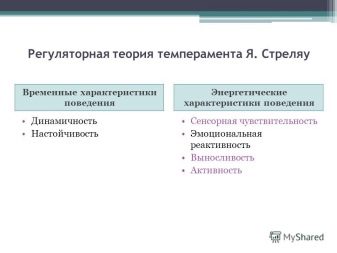
Smirnov's questionnaire
Answering the test questions, we are not always as sincere as possible, or we are trying to pass off wishful thinking. This questionnaire allows you to determine not only the activity and type of reaction, but also to reveal the percentage of sincerity with which the answers were given.It is very convenient to use this for elementary school children, as kids are often afraid to give the "wrong" answer and embellish reality. Such efforts can affect the final result.
Belov's method "Formula of temperament"
The personality structure, according to Belov, is not homogeneous. That is, there are no pure sanguine or choleric people. One of the types may prevail, but this does not mean that in certain situations he cannot behave completely uncharacteristic for his type of temperament. This is what Belov's questionnaire is based on. The test shows in what proportions these 4 main types coexist in a person. This feature should be taken into account, including when choosing a profession, so that the planned results become a reality.
As for the test itself, it is very simple and easy to count. 4 cards contain 20 expressions each. Each of the blocks corresponds to one of the types of temperament. The card with more advantages will determine the main type.
The test should be carried out in a calm environment, but do not allow the subject to think for a long time.
How to determine the type of temperament - see the next video.








